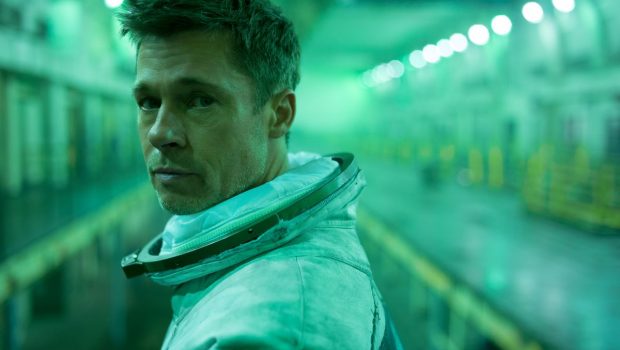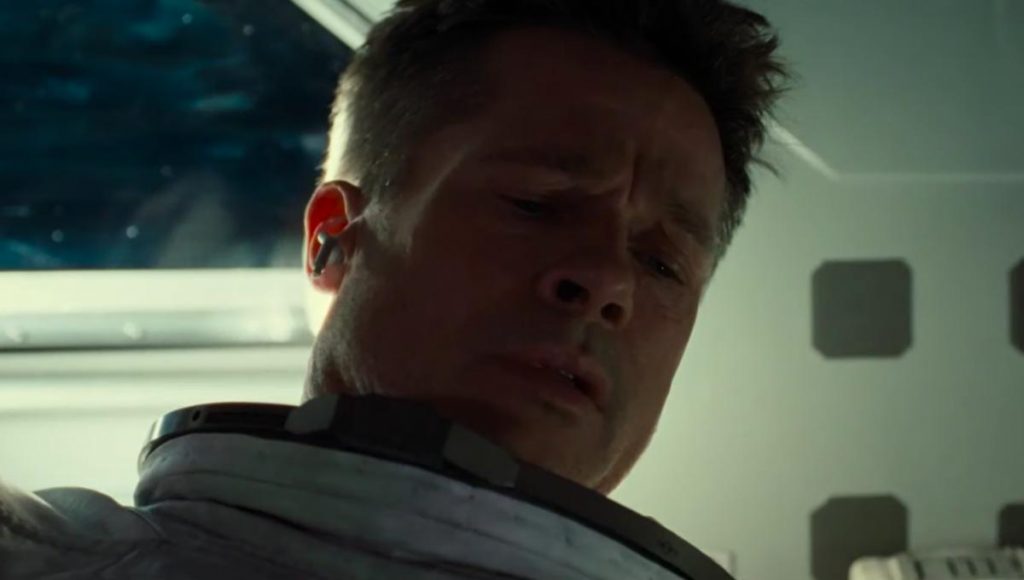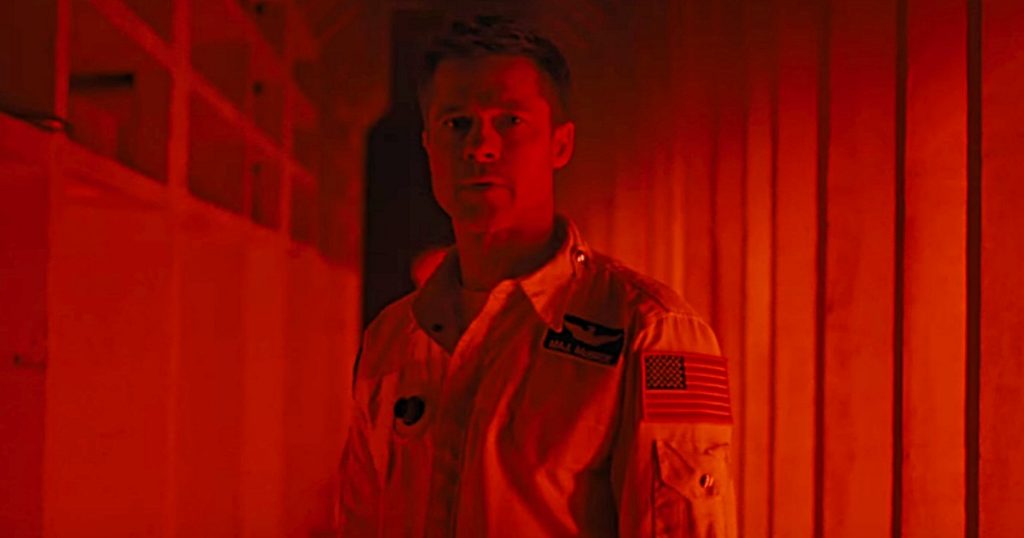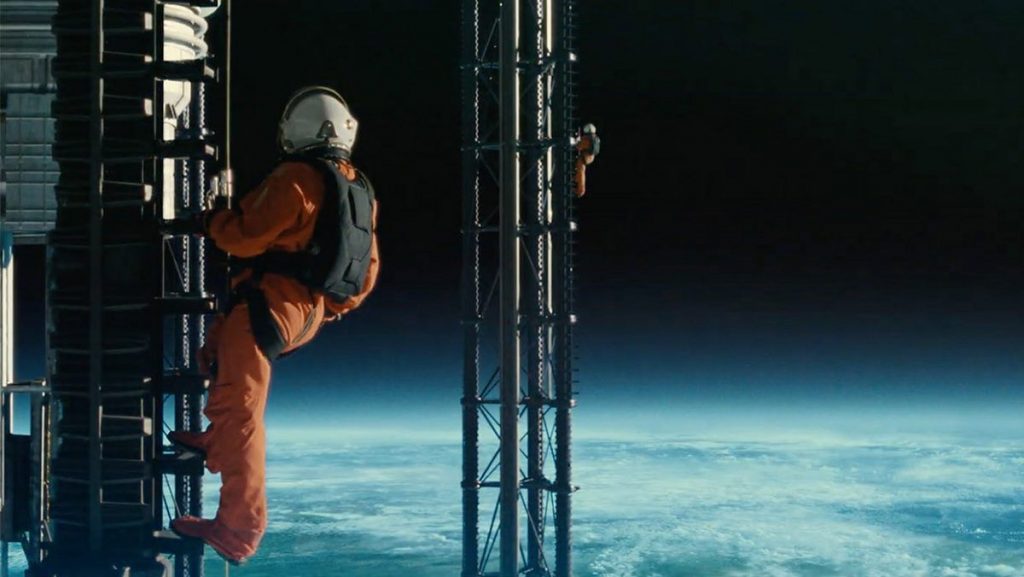Ad Astra – Film Review
Reviewed by Damien Straker on the 26th of September 2019
Fox presents a film by James Gray
Produced by Brad Pitt, Dede Gardner, Jeremy Kleiner, James Gray, Anthony Katagas, Rodrigo Teixeira, and Arnon Milchan
Written by James Gray and Ethan Gross
Starring Brad Pitt, Donald Sutherland, Tommy Lee Jones, Ruth Negga, Liv Tyler, and Natasha Lyonne
Music by Max Richter
Cinematography Hoyte van Hoytema
Edited by John Axelrad and Lee Haugen
Running Time: 124 minutes
Rating: M
Release Date: the 19th of September 2019
Brad Pitt is excellent in this otherwise uneven space voyage directed by James Gray. By using his eyes, Pitt conveys the repressed trauma and conflicted emotions of a man uncertain about his feelings for his once absent father. His character’s search for his parentage channels Francis Ford Coppola’s Vietnam War epic Apocalypse Now (1979) and its infamous Kurtz figure, and highlights clever world-building from Gray. However, the material feels thin and derivative of Gray’s previous film The Lost City of Z (2016). While it is hard to be critical of a filmmaker who understands film grammar as strongly as Gray, Astra’s narrow story fails to match the sharp production values and Pitt’s incredible performance.
Pitt plays Roy McBride, an astronaut who separated from his wife (Liv Tyler) to undertake dangerous space exploration missions. His journeys have made him feel completely detached from his peers too. After an accident, Roy is assigned to a new mission. His superiors declare that his father, H. Clifford (Tommy Lee Jones), needs to be located on Neptune because he is crucial to solving the Lima Project and the power surges threatening Earth. However, Roy is concerned that his superiors have hidden motives regarding Clifford, who has not been heard from in sixteen years. Fortunately, Roy is aided by Colonel Pruitt (Donald Sutherland) on the first part of the journey to learn if his father is alive and what sort of man he is.
Astra’s stylistic choices build character and broader thematic goals that reflect Roy’s introverted nature. Since the film is viewed entirely from Roy’s perspective, it is subjective cinema. Gray shoots Pitt in narrow corridors and in tight close-up shots so that the actor underlines the inner conflict and hurt found in Roy’s eyes. When his superiors first brief him on his father, his expressions infer the ‘hope and conflict’ first referenced by his voice over.
He searches in himself to determine how he really feels about a man who has crippled his own emotional connections to people, including his wife. One scene is photographed using a point-of-view shot so the moment is seen directly from Roy’s eyes. The people greeting Roy smile happily in front of the camera. Yet his voice tells us that his amicability is ‘a performance’. His estrangement from his father and his space missions have dissolved his warmth and need for human connections.
Gray and cinematographer Hoyte van Hoytema (Interstellar; Dunkirk) create small interesting world details and frame extraordinary cosmic images too. Some of the most enjoyable moments include seeing humorous advertising signs and people boarding for commercial moon travel without heavy exposition. There is also an unexpected set piece is in the first half when Roy’s convoy of moon buggies is attacked by space pirates. The staging and sound design is spectacularly realised, particularly the muffled gun shots heard from Roy’s perspective. Strangely, the moment is isolated because the pirates are never seen again. There is also a weird episode where Roy is attacked by a primate, which must be a homage to Apocalypse’s panther attack scene.
Meanwhile, the wide shots of the earth are handsome and thematically imperative. The beautiful, expansive cosmic imagery reflects Roy’s physical and emotional detachment from the earth and the void left by Clifford. The void infers a god-complex too. Roy is searching for his creator whose existence is fleeting and interpreted by some as violent. The film’s best depiction of emotional detachment involves Roy free-falling from a space station. The moment is terrifyingly staged and makes us long for similarly inventive set pieces in the back end. At most there is a scene with changing holographic wallpaper, which is showy but not nearly as purposeful.
Astra’s unwavering diligence to Roy prevents it from being an iconic space journey. While the first half is visceral and exciting, the second half is slow and reveals the thin story. The dramatic stretch is apparent in the underused side characters. Before disappearing from the movie, Donald Sutherland offers brittle physicality and is given more time than the underused women. Bizarrely, Natasha Lyonne (Russian Doll, 2019) features in a distracting cameo as a secretary and Ruth Negga (Loving, 2016) only has a small part as a person whose parents were affected by Clifford. Tommy Lee Jones mostly features on screens until the end and Liv Tyler is relegated to quick flashback scenes.
These underused actors could have been provided greater depth to an otherwise single-track narrative. Since the story is entirely from Roy’s perspective, even his wife is only glimpsed briefly. Additional perspectives could have prevented Astra from falling into clichés, such as a parental trauma infringing on a man’s ability to connect to women in the present day. If it were more interested in that dramatic angle it could have made the female characters more complex than their largely superfluous cameos. Alfonso Cuarón’s terrific space adventure Gravity (2013) covered similar territory relating to grief and detachment but felt fresh because it was led by a powerful female hero.
While heavily indebted to Apocalypse Now, Astra does not develop as many unforgettable episodes as Coppola’s war film. It is also too derivative of The Lost City of Z’s themes about conflicted fathers and sons and how they are determined to follow in each other’s footsteps. The voice over ensures that particularly story idea lands with a thud. A wider spectrum of characters and greater generosity to the side actors could have added depth and ignited the glacial pacing. Fortunately, Pitt’s subtle performance adds emotional resonance despite Roy’s best efforts to hold us at arm’s length.
Summary: Ad Astra’s narrow story fails to match the sharp production values and Pitt’s incredible performance.










